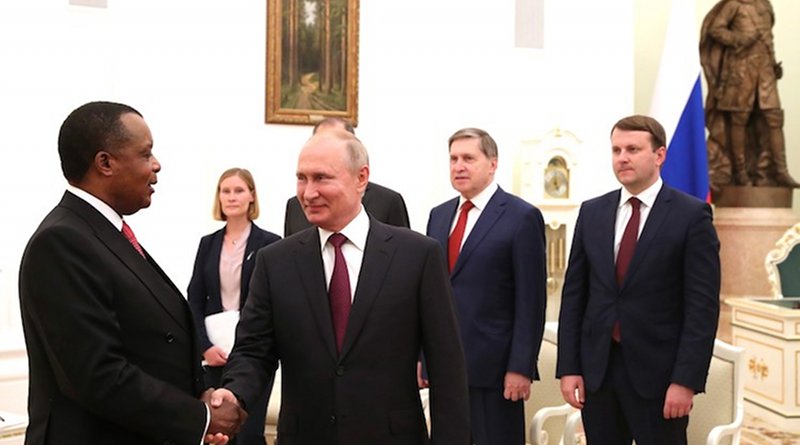Congo Seeks Closer Relations With Russia – OpEd
Russia
and the Republic of Congo have enjoyed good bilateral relations over
more than five decades. But, as President Denis Sassou-Nguesso’s talks
at the Kremlin reveal, there are still prospects for strengthening ties
between the two countries, especially in the economic and security
spheres. This was affirmed by Russian President Vladimir Putin,
welcoming the Congolese delegation on May 23, 2019.
“It is not your first time in Russia. Our countries have always had
friendly relations that has been developing this way for 55 years now.
Our trade is growing – by over 60 percent – although, unfortunately, the
numbers in absolute terms are still modest. But, we have good potential
in several industries, such as energy, the processing industry and
agriculture,” Putin said.
Not hiding expectations to elevate bilateral relations from November 2012 level when he last visited Moscow, Sassou-Nguesso assertively asked Russia for support and assistance in bringing total peace in Central Africa comprising the Congo, Democratic Republic of the Congo, Central African Republic, Cameroon and Chad.
“We preside over the International Conference of the Great Lakes Region. We are playing a stabilizing role in Africa that can bring peace to this region. We in our country want to stabilize the situation as a whole. We hope that Russia will act side by side with us to create peace in the African region,” Sassou-Nguesso told Putin.
Apparently asking for Russia’s greater engagement, the Congolese leader said: “You know that in economic terms there was a certain crisis associated with a decrease in oil prices. This crisis affected us, but we are gradually recovering. Now we are negotiating with the IMF on obtaining loans, we are negotiating with the IMF Executive Board and hope to get support in this matter from our Russian friends.”
After official talks between Putin and Sassou-Nguesso, a package of documents was signed, including intergovernmental agreements on cooperation in the peaceful use of nuclear energy and mass communications.
The documents also concern the settlement of the Republic of the Congo’s debt to the Russian Federation under previously issued loans, cooperation between the Russian Interior Ministry and the Congolese Ministry of the Interior and Decentralization, cooperation in agriculture, and sending Russian military experts to the Republic of the Congo.
Among the documents signed were those concerning the relations between Lukoil and the State Oil Company of the Republic of the Congo as well as between TMK (Pipe Metallurgical Company) and the National Petroleum Company of the Congo.
In an interview with Itar-TASS News Agency, Sassou-Nguesso also underscored that “Russia is an important country, a strategic partner that may play its role in the period when Africa is looking for cooperation in building a new world in the region, building infrastructure, new economic and security systems. The African people want to develop their economy and to establish themselves on the global arena. Russia may hold a strategic position on this issue.”
Last year’s growth in bilateral trade was primarily due to a rise in Russia’s exports of foodstuffs and agricultural goods to Congo. Thus, bilateral trade reached US$38.4 million in 2018, according to the Russian Federal Customs Service.
Seven years ago, precisely in November 2012, Vladimir Putin last had an official meeting with Sassou-Nguesso, in Novo-Ogaryovo near Moscow.
“Welcome to Moscow! It gives me great pleasure to meet with you in the Russian capital. We know you as a very good friend of our country. A third of your Government is made up of graduates of Soviet and Russian universities. I very much hope that you will see that you have many friends here in Russia and feel the warmth of our hearts,” he said welcoming Congolese leader to the the presidential office in Novo-Ogaryovo.
“Strong bonds of friendship and cooperation have been developing between the two nations since 1964. We have experience of joint projects in all areas. Thousands of Congolese people attended Russian universities, and now there are government members in my delegation who studied here. Some of them got married and started families in Russia, so we have a very close relationship,” the Congolese leader told Putin.
In the aftermath of the Soviet Union, Russia has continued efforts that resulted in successful collaboration and pursued opportunities for cooperation in the past years. Of considerable interest was that both Russia and Congo agreed on economic cooperation, which involves a wide range of industries, including energy, infrastructure and transport, as well as humanitarian ties. All of these areas are of considerable interest to both Russia and Congo.
Indeed, relations has been sustained. As far back as February 2006, Vladimir Putin sent a congratulatory message to Denis Sassou-Nguesso soon after he had assumed the leadership of the African Union (AU).
The message read, in particular: “In Russia you are well-known as an authoritative African leader and a persistent supporter of developing the traditionally friendly Russian-African relations. I am convinced that as head of the African Union you will not only give additional momentum to deepening political and economic integration as well as strengthening peace and stability on the continent, but that you will also help expand the ties between the (African) Union and Russia.”
Putin noted with satisfaction the increasing role that African states are playing on the international stage and their aspirations to contribute by developing consolidated approaches towards resolving the key questions, and further welcomed the African community’s active efforts towards forming a basis for collective security, including their own peace making structures.
Putin further emphasized in his message that Russia was interested in developing cooperation on multiple levels with African states and improving cooperation with the African Union, the leading international organization on the continent. In the future, Russia would actively participate in the international community’s efforts to help implement the programme, the New Partnership for Africa’s Development (NEPAD), including during Russia’s G8 presidency.

